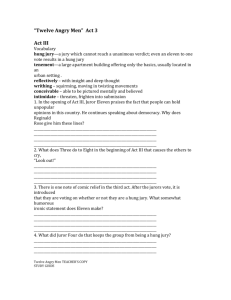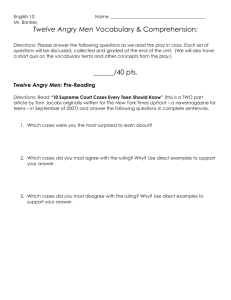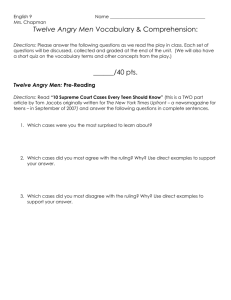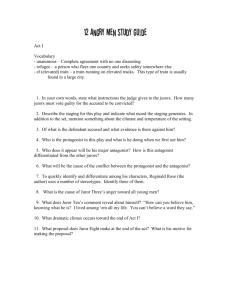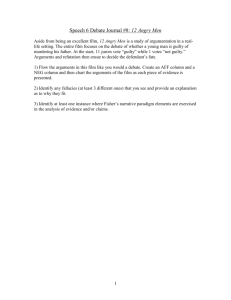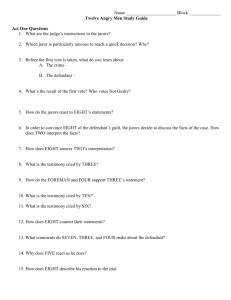Twelve Angry Men
advertisement
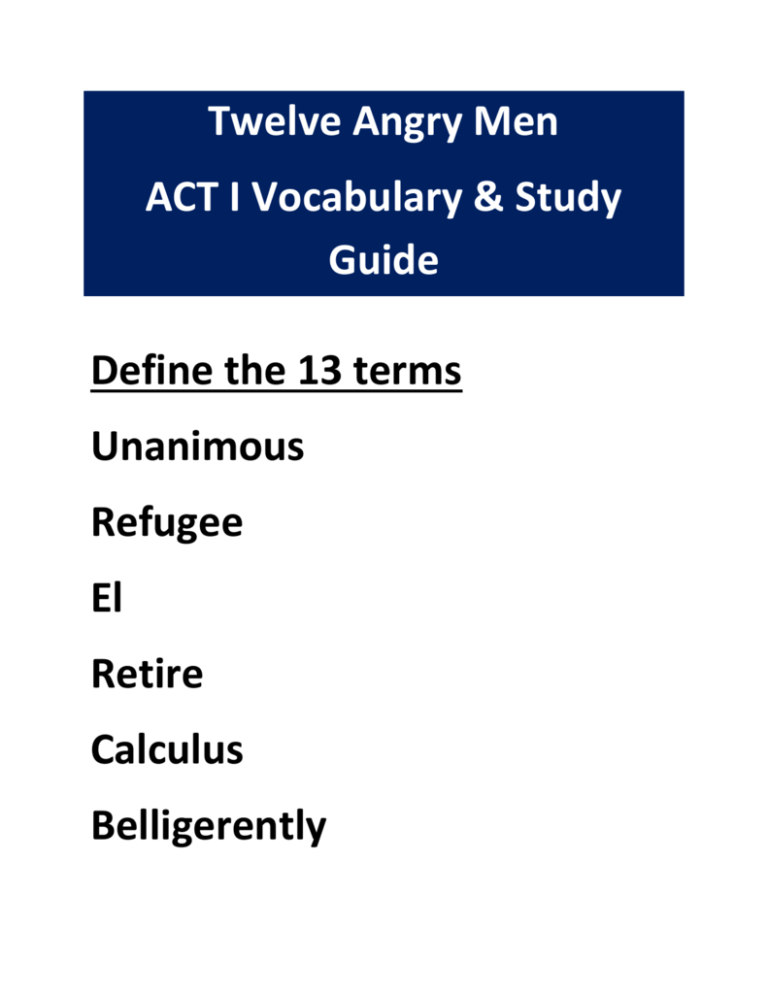
Twelve Angry Men ACT I Vocabulary & Study Guide Define the 13 terms Unanimous Refugee El Retire Calculus Belligerently Monopoly Switch knife Proposition Bickering Mugging Breeding ground Flimsy 1. In your own words, state what instructions the judge gives to the jurors. How many jurors must vote for the accused to be convicted? 2. Before the jurors are locked in their room, what is the last thing they hear that might influence their thinking when deciding the defendant’s guilt or innocence? 3. Describe the staging for this play and indicate what mood the staging generates. (In addition to the set, mention something about the climate and temperature of the set.) 4. Of what is the defendant accused and what evidence is there against him? 5. Who is the protagonist in this play and what is he doing when we first see him? 6. Who does it appear will be his major antagonist? How is the antagonist differentiated from the other jurors? 7. What will be the cause of the conflict between the protagonist and antagonist? 8. To quickly identify and differentiate among his characters, Rose uses a number of stereotypes. Identify at least three of them. 9. What is the cause of Three’s anger toward all young men? 10. What does Ten’s following comment reveal about himself? “How can you believe him, knowing what he is? I lived among ‘me all my life. You can’t believe a word they say.” 11. Juror Eight says he had a peculiar feeling about this trial. What does he think was wrong? 12. The foreman asks the guard to bring in the switchblade knife. Why? 13. Juror Four questions the logic of Eight’s premise that the boy did lose the knife. What is his sarcastic question to Eight? 14. What dramatic climax occurs toward the end of Act I? 15. What proposal does Juror Eight make at the end of the act? What is his motive for making the proposal? 16. From what you have learned of the jurors thus far, which one(s) would you want on your jury if you were on trial, and explain why. Which one(s) would you not want? Why? *SAVE INTO 12 ANGRY MEN DESKTOP ELA FOLDER* ACT II 12 Angry Men Vocabulary Define the 8 terms Technicality Sadist Pantomime Insignificant Ensuing Sheepishly Blunder Discrepancy 1. What causes the conflict between jurors Three & Five at the opening of this scene? 2. Why does Nine change his vote? Who is Nine? 3. Jurors Two and Four are at the water cooler, and when Two asks the meaning of reasonable doubt. What is Four’s explanation? 4. What is the point that Eight makes about a passing elevated train? 5. Nine thinks the old man might have said what he said in order to get attention, not because he actually heard anything. What led him to this conclusion? 6. When Three and Nine are arguing over whether the old witness said that it took him fifteen or twenty seconds to get to the door, what does Three say? 7. Why does Three immediately look sheepish after he says this? 8. What is the point of all the measuring that Eight does? 9. Why is it so important for Three that the boy be convicted? 10. Juror Three attempts to discredit another juror. How does he try to do that and why? 11. In Juror Three’s anger, he refers to the rest of the jury in a derogatory fashion. How does he do that? 12. On what dramatic note does this act end? What makes the dramatic climax so significant? *Save document to 12 Angry Men desktop ELA folder* Act III 12 Angry Men Vocabulary Define the 6 terms Hung jury Tenement Reflectively Writhing Conceivable Intimidate 1. In the opinion of Act III, Juror Eleven praises the fact that people can hold unpopular opinions in this country. He continues speaking about democracy. Why does Reginald Rose give him these lines? 2. What does Three do to Eight in the beginning of Act III that causes the others to cry, “Look out!” 3. There is one note of comic relief in the third act. After the jurors vote, it is introduced that they are voting on whether or not they are a hung jury. What somewhat humorous ironic statement does Eleven make? 4. What did Juror Four do that keeps the group from being a hung jury? 5. Juror Eleven makes a suggestion that one of the others does not understand “reasonable doubt.” To whom is he directing his remark, and why is the other juror angry? 6. Why is Five convinced that the boy did not stab his father? What makes Five an authority? 7. After Five’s comments about the knife, another vote is taken. How does the count stand after this vote? 8. In the scene where Ten starts talking about “those people,” why do the other jurors get up from the table? 9. What comments does Juror Eight make that seem to settle the argument about “doubt”? 10. To Four, what is the most convincing evidence that the boy is guilty? 11. What is brought up to refute the woman’s claim that she saw the boy kill his father? 12. What piece of stage business forces the jurors to think about the woman and her glasses? 13. Why does Four change his vote to not guilty? 14. What is the dramatic climax of this act? 15. Did Three finally believe the boy was not guilty, or did he vote just to get it over with? Support your answer. 16. What is the major point of this play? *Save your document to your 12 Angry Men Desktop Folder* Final Exam Date: ???? You may use any of your notes and vocabulary on the exam.
